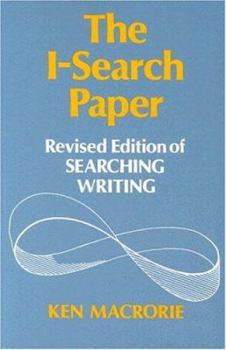The I-Search Paper: Revised Edition of Searching Writing
Select Format
Select Condition 
Book Overview
This revised and retitled edition of Searching Writing includes two additional I-Search papers, one by a teacher, and a new chapter entitled "The Larger Context," which shows how the I Search concept can work throughout the whole curriculum in school and college. As with the first edition, The I-Search Paper is more than just a textbook; it's a new form of instructional help -- a context book -- that shows students what authority is in matters of learning and invites them to join the author and teacher in the educational movement called "Writing to Learn." To put this book in the hands of all the students in the course is not only to help them carry out an I-Search but to introduce them in a delightful way to the resources and tools of intellectual inquiry -- but one that never forgets the emotional or physical side of human activity. This is a rare textbook that treats students as partners in learning. It shows what it is to take charge of one's own learning and suggests that this move is one that productive people keep making throughout their lives.
Format:Paperback
Language:English
ISBN:0867092238
ISBN13:9780867092233
Release Date:July 1988
Publisher:Heinemann Educational Books
Length:359 Pages
Weight:1.27 lbs.
Dimensions:1.2" x 6.0" x 9.0"
Age Range:12 to 17 years
Grade Range:Postsecondary
Customer Reviews
2 ratings
A Wonderful Way for Students to Learn to Not Hate Research!
Published by Thriftbooks.com User , 24 years ago
I came across this book while studying for my oral exam for my MA, and I tried its ideas and techniques the following semester with my Freshman English students. Many students hate research papers because of their boring and often confusing formats, but Macrorie has given students a new way to research that focuses on what they learn and experience, not what they find in a book. While my students grumbled and complained at first that they had to try something new and different, the more work they did on it, the more they realized how beneficial it was. Most chose to write on the fields they were hoping to go into once they had graduated, and several found out that those careers weren't something they wanted to do after all. In the end, they loved it, and I continue to use this as the research element in my freshman level classes.For any teachers or students looking for new approaches to take to research writing, this book offers promising solutions. I've recommended it to fellow instructors, and when they use its ideas, they and their students love it, too.
Why Research, I-Search
Published by Thriftbooks.com User , 24 years ago
In his book, The I-Search Paper, Ken MacRorie gives teachers an outstanding alternative method for teaching the research process to students of all ages. According to MacRorie, I-Searching is a way to research without the traditional encyclopedia articles and books. Instead, MacRorie encourages students to streatch their minds and find new places to gather information. He has his students choose their own topics, research those topics by any means possible, and write the drafts of their papers in story form. The final project is also written in this format so that students are forced to reflect upon the process that helped them answer their question. In MacRorie's method, the I in "I-Search" is the student. "I am searching to find out if spider monkeys make good pets," or "I am searching to discover which camera would be the most useful to me for personal use." These are the types of topics that students choose for their "I-Searches." As in any project that is dependent on student interviews and such, different levels fo energy, enthusiasm and effort will be applied to the completion of the task. Several students will be highly motivated, will hunt down credible sources and will find answers to the questions they posed in their topics. On the other hand, some students will allow one dead end to complete their search. MacRorie acknowledges this possibility with the example of one pupil who knew of a source in her hometown. Although she had called a couple of times and got no answer, she never visited this person's home to gather the necessary information, and therefor turned in an incomplete report. MacRorie includes this example to show that his method only works with the proper supervision and encouragement. Overall, Ken MacRorie provides instructors with several examples of both strong and weak "I-Search" papers, and he explains what makes each one a good or bad example. Through his use of examples, MacRorie allows teachers to focus on the writing process because they already know what the outcome should look and sound like.






